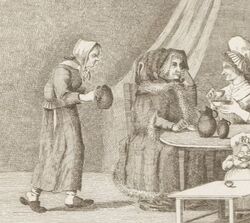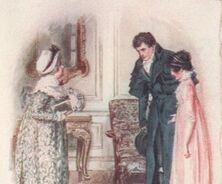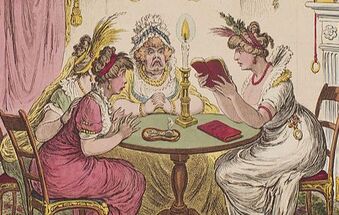| Clutching My Pearls is about Jane Austen and the times she lived in. Austen engaged with many of the same topics and issues that other novelists of the long 18th century wrote about, including the topic of female education. Click here for the first in the series.
|
 Suggested by Lady Catherine herself!
Suggested by Lady Catherine herself! Though their household is in chaos, the Prices still cling to the appearance of gentility. Pouring and serving the tea is genteel, carrying in the tray and heating the water is not. We recall as well how Mrs. Bennet is offended when Mr. Collins supposes that one of her daughters had a hand in preparing the dinner she served him. Financial disaster stalks the family if Mr. Bennet dies, but Mrs. Bennet wants the world to know that her daughters don't know how to cook. On the other side of the coin, Austen holds Lady Catherine De Bourgh up to ridicule for her vulgar interference in the minutia of Mrs. Collins' housekeeping. Such details should be beneath her notice.
The novels and conduct-books of the day were unanimous in agreeing that all young women should have some education in how to run a household, even if they never had to do any of the common household chores, and many warned that a genteel education which stressed accomplishments might be useful for the season of courtship, but it was a poor preparation for married life...
 A slatternly servant brings hot water in this print (detail) by Friedrich Rottmann
A slatternly servant brings hot water in this print (detail) by Friedrich Rottmann The narrator in Matilda Mortimer (1809) opines, “How can the mistress of a house know how to manage her family, and see that her servants do justice by her, if she be not capable of directing them? What disorder creeps into a family, the mistress of which is ignorant of household affairs! What discontent, nay, not unfrequently, what unhappiness, it creates, between the husband and wife! How pernicious is such an example to the children!"
Major Farringdon in I’ll Consider Of It! (1812) complains that girls today are “victims of a false education, consisting only in shewy and trivial accomplishments, our women are not only half-learned, or almost ignorant, but they are utter strangers to the domestic duties, and the rearing of their own offspring..."
Ignorance could even be fatal to the children. In the final volume of Thinks I To Myself (1811), an otherwise comic novel, the author turns serious and editorializes for several pages about nursery-maids who kill their charges out of ignorance about their proper diet and care: "I cannot call my nine brothers and sisters back again... I would advise everybody else, who happens to feel any desire to have their children to live... to keep an eye on these particulars."
The heroine in Bear and Forbear (1809) was more fortunate because her mother had: “instructed her [daughter] in those accomplishments which make young women agreeable in society, [she also] taught her to be a good housewife; which is always useful, and often absolutely necessary to a young person, in whatever situation of life she may be placed.”
 Catherine: a sad heedless young housekeeper
Catherine: a sad heedless young housekeeper Emma Woodhouse competently and confidently manages her father's household without any fanfare or self-congratulation. Catherine Morland's mother remarks that young “'Catherine would make a sad, heedless young housekeeper to be sure,' ...but quick was the consolation of there being nothing like practice."
Scholar Eleanor Ann Lochrie notes that “In particular, Austen dramatises the impact of badly educated mothers who abdicate responsibility for their household. In Pride and Prejudice Mrs Bennet‘s daughters are beyond her control, resulting in an impropriety of behaviour which makes the family the gossip of the neighbourhood and eventually leads to Lydia‘s downfall. In Mansfield Park the influence of loose morals and superficiality in the household can be traced to Lady Bertram‘s complete failure to exercise any kind of authority over her domain in her husband‘s absence, the consequences of which are felt by her ruined daughter at the end of the novel. The effects of defective household management may also be seen in the home of Fanny‘s parents in Portsmouth.”
The Price's household is a “scene of mismanagement and discomfort from beginning to end.” Despite Lady Bertram's indolence, Mansfield Park is well-regulated, in part because of her competent housekeeper and butler. (And, Mrs. Norris would add, because of her own vigilance over the servants.) But, as Lochrie points out, the consequences of Lady Bertram’s indolence go farther than whether tea is served on time.
When Sir Thomas goes away to Antigua, the young people put on a play featuring an unwed mother (played by Maria) and a pert and forward coquette (played by Mary Crawford). Fanny is shocked by the play, thinking it entirely improper, but Lady Bertram is too indolent to take the least notice when Maria and Henry Crawford are brought into a "dangerous intimacy" by rehearsing together.
 Reading trashy novels in "Tales of Wonder" (detail) Gillray
Reading trashy novels in "Tales of Wonder" (detail) Gillray I've come across a novel which used the same plot device that Austen used in Mansfield Park--a husband's extended absence in the West Indies--to bring about the crisis.
In A Tale of Warning, or the Victims of Indolence (1810), the main character, Agatha, doesn't bother to manage her own household, just like Lady Bertram. She prefers reading trashy novels. Her husband goes away to the West Indies on military duty. Agatha promises to manage the household in his absence, but soon agrees it would be best if her little boy Archibald was sent away to live with the nursery maid. “Agatha, who from a child had never taken the trouble to think or decide for herself, [shades of Lady Bertram!] suffered Nanny, as usual, to direct her...”
When Agatha’s husband returns, “after suffering hardships and dangers innumerable” he is very upset, of course. “So, it is for trash like this, that your Archibald is abandoned! Instead of reading moral books, that would teach you your duty, or such as would store your mind with useful knowledge, you deprave your understanding with pernicious works, without the shadow of merit or originality, which shut your heart against true feeling...” Just then, a servant brings the tragic news that little Archibald, who was poorly supervised, has fallen out of a window and died.
A Tale of Warning was a novel for young people, so the message is laid on thickly. Austen's touch, thankfully, is more humorous and subtle but the explosion of Maria Rushworth's marriage has serious and lifelong consequences for her and her family, and Austen makes it clear Maria's tragedy has its roots in the lack of guidance she received in her youth.
| I am not suggesting that Austen borrowed the idea of bad consequences arising out of the husband's trip to the West Indies from A Tale of Warning. Novelists of this time frequently sent their characters to the West Indies or India to get them out of the way for plot purposes, and in this case, the plot purpose just happened to be similar. Agatha's husband goes to the West Indies because he is a soldier. While there, he helps out a plantation-owner in danger of bankruptcy, and this is given as an example of his (the husband's) decency and good character. Austen is less specific about what Sir Thomas does in Antigua but it has to do with sorting out business affairs. Although all her references to Sir Thomas’s trip to Antigua have to do with the dangers and hardships that he undergoes, with no mention of enslaved humans, modern interpreters of the novel argue that the references to Antigua must surely be anti-slavery references, a question I took up last year. Today, of course, modern readers question what the fuss over "Lover's Vows" is about, although Austen expresses Edmund and Fanny’s objections clearly and at some length. Podcasters Kristin and Maggie discuss the importance of the play in Mansfield Park in this episode of the First Impressions podcast. Previous post: Education for your station Next post: What Austen said about the West Indies |
| Lochrie, Eleanor Ann. Debates on female education: constructing the middle ground in eighteenth century women's magazines and the novels of Fanny Burney and Jane Austen. Diss. University of Strathclyde, 2010. "Austen‘s most overt comments on the effects of education, in both men and women, come in Mansfield Park.” |

 RSS Feed
RSS Feed